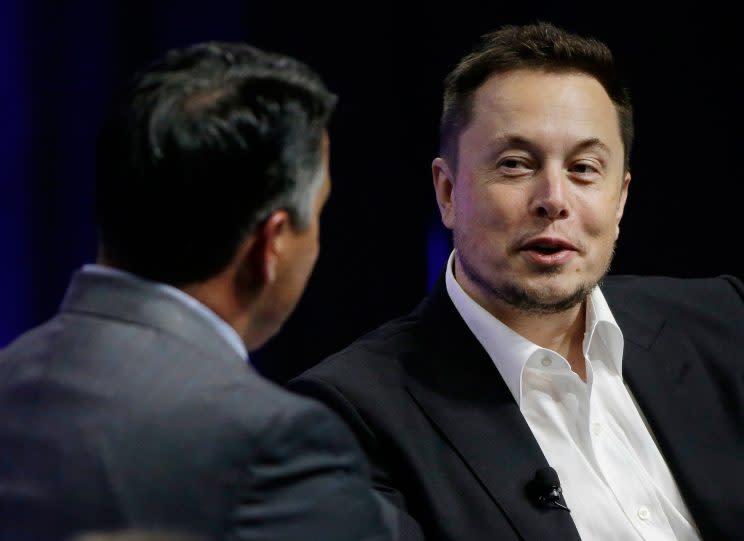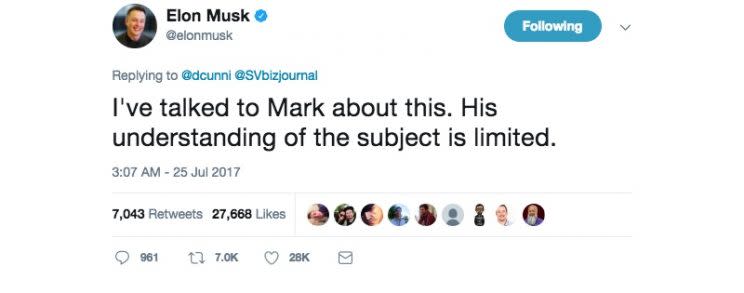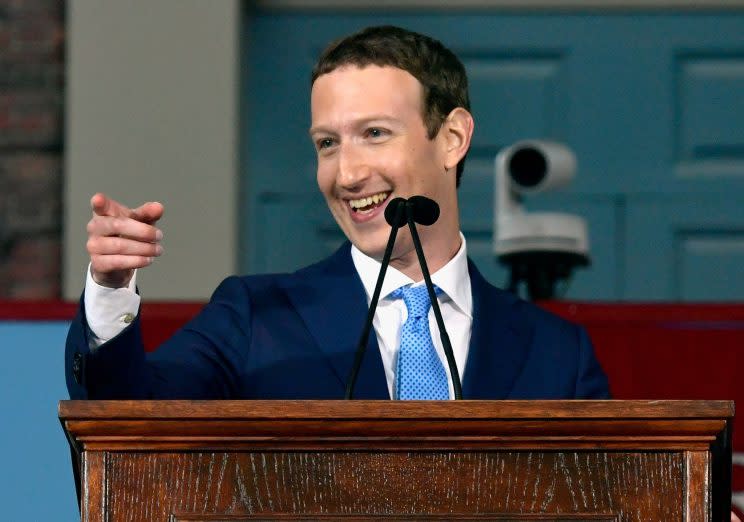Why Mark Zuckerberg and Elon Musk are fighting

Tesla (TSLA) and Space X CEO Elon Musk and Facebook (FB) CEO Mark Zuckerberg, two richest, most successful people on Earth, are beefing. Okay, they’re not exactly beefing — it’s more like they’re having a very public disagreement on social media for the whole world to see.
In a tweet posted Tuesday, Musk accused Zuckerberg of having a limited understanding of artificial intelligence. The comment comes after Zuckerberg criticized Musk in a Facebook Live video calling the Tesla founder’s stance that AI poses an “existential threat” to mankind “pretty irresponsible.”

AI is at the heart of Facebook’s future
Zuckerberg is no stranger to public policy debates. During his commencement address at Harvard University in May, he advocated to a universal basic income. Zuckerberg has also donated a huge chunk of his wealth to philanthropic efforts, including $3 billion from the Chan Zuckerberg Initiative, named for the Facebook founder and his wife, fellow Harvard graduate Priscilla Chan, to cure all diseases.
During his Facebook Live stream, Zuckerberg said that slowing the advancement of AI will impact the development of technologies ranging from self-driving cars to advanced medical diagnoses methods.

Zuckerberg, however, isn’t only defending AI out of the goodness of his heart. The technology is also a key part of Facebook’s future.
Like every major tech company, Facebook is making enormous investments in the field of artificial intelligence. The goal for the social media network is to create realistic bots that you can speak to as if they were actual humans.
But that’s not all. In February, Wired quoted Facebook’s director of applied machine learning Joaquin Candela as telling a conference in New York that the social network could not exist without artificial intelligence. Candela went on to say that everything from Facebook itself to Messenger and Instagram uses some kind of AI.
So while it makes sense for Zuckerberg to defend AI’s ability to be used as a means to help humanity, it makes just as much sense for him to protect the further development of the technology for his massive social networks.
Elon isn’t always right
Last week, Musk made headlines when he said that AI poses a threat to humankind that no one will take seriously until robots are walking down the street killing people.
It’s not that Musk doesn’t believe in AI; in fact, Tesla uses the technology to power the self-driving capabilities of its vehicles. It’s also worth pointing out that Tesla is first and foremost an electric car company, so it’s not entirely dependent on AI.
Still, Musk isn’t fundamentally against using AI. Rather, he is strongly advocating for some form of government regulation to keep it in check, lest the technology become too powerful to control.
That said, Zuckerberg isn’t the only one who thinks Musk might be going to far with his doomsday scenarios about killer robots. Manuela Veloso, department head of the machine learning department at Carnegie Mellon’s School of Computer Science, also believes in regulating AI, but only if it’s packaged in a product that will reach consumers. Researchers, on the other hand, she said, should be free to work on the technology without any limitations.
While Musk may hope to see regulations governing AI, it’s unlikely to happen any time soon. A House panel only recently began talking about federal rules for self-driving cars, and those are already on the roads in some states. So it looks like for now at least, Zuckerberg wins this argument.
More From Dan:
Motorola’s Moto Z2 Force is a smartphone guaranteed not to shatter
Why it might be ‘dangerous’ for IBM to turn itself around: professor
Microsoft Surface Laptop review: A great notebook with one small flaw
Amazon’s Echo and other smart speakers do much more than you realize
Email Daniel at dhowley@yahoo-inc.com; follow him on Twitter at @DanielHowley.

 Yahoo Finance
Yahoo Finance 
